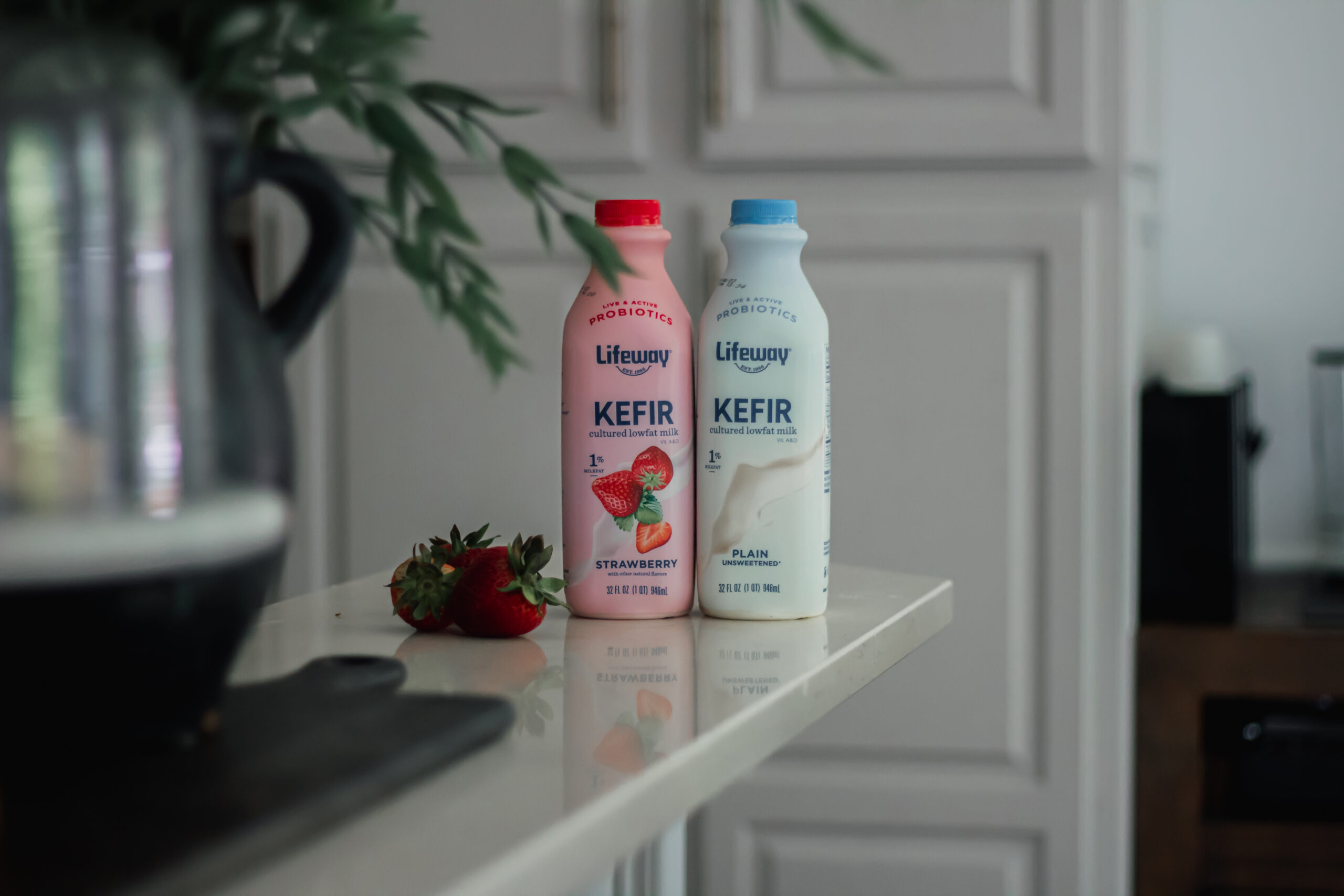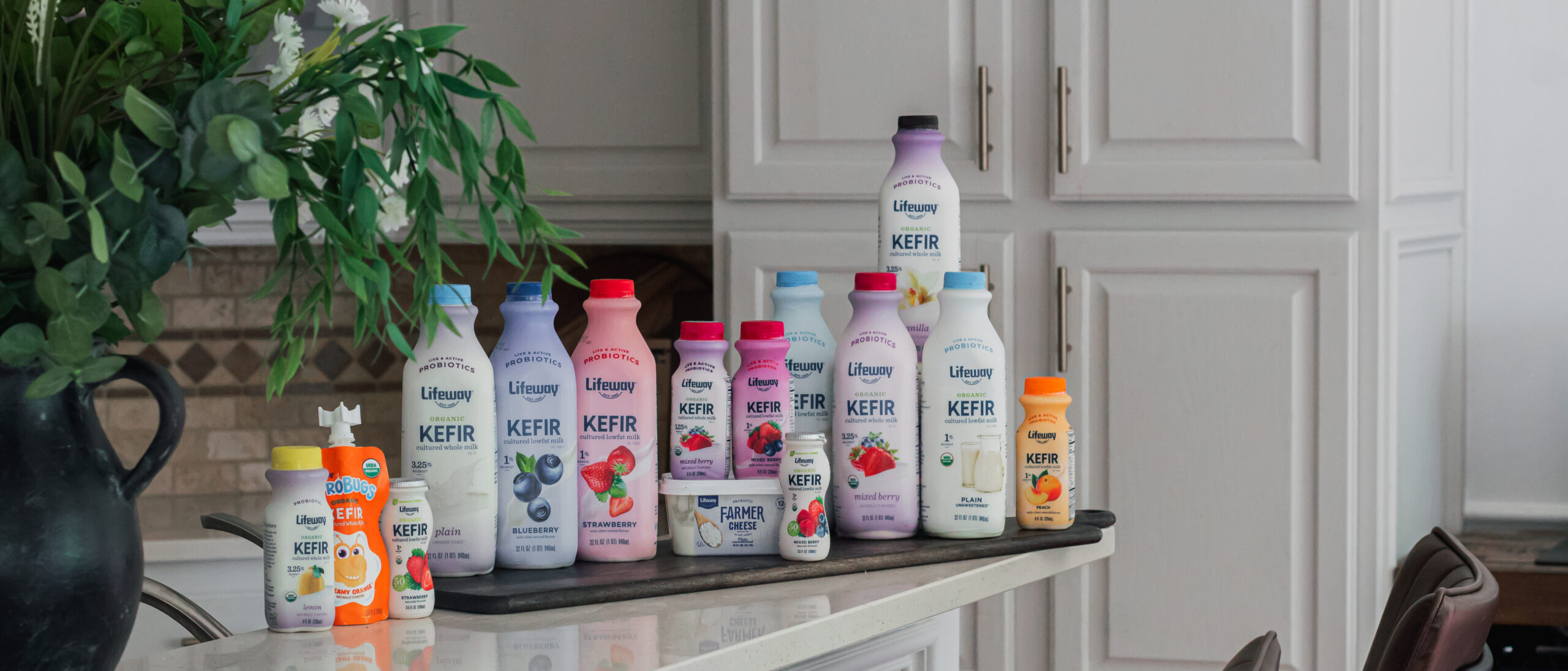Confused about the buzz around dairy and whether you should consume it or not? With concerns about lactose intolerance and claims that dairy can increase inflammation, it’s no wonder people are advocating against it. But it’s not always so black and white – in fact, cultured (or fermented) dairy is particularly beneficial. It can often be consumed by those who are lactose intolerant and the probiotics can help reduce inflammation and improve digestion. With all of the misinformation floating around, we’ve decided to help break down some of the confusion and explain what you need to know about kefir: the fermented, probiotic-rich dairy drink you should be drinking.

Kefir vs. Plain Dairy Milk
Not all dairy is made equal: there’s a huge difference between just plain milk and kefir. Although kefir is a dairy product and is made from milk, the most important thing to consider is how it’s made. The process of fermenting milk to produce kefir provides probiotics – the healthy kind of bacteria. The fermentation process also consumes most of the sugar – specifically, lactose, which makes it an option suitable for those who are lactose intolerant. In addition, the probiotics found in kefir change the nutritional properties of milk during the longer fermentation process by enriching the content of B vitamins, vitamin K, folic acid, and calcium. They also break down the protein into beneficial peptides, which make it easier to digest for some, and are being touted for their antioxidant, anti-hypertensive, and anti-inflammatory properties.
The misconception that dairy leads to inflammation stems from the belief that the consumption of milk with genetically modified growth hormone has the potential to change human hormone levels, but the latest systematic study reviewing clinical evidence between dairy products and inflammation could not find sufficient evidence to support the validity of this claim. In fact, this same study documented the opposite, showing that in the majority of studies reviewed, dairy had a significant anti-inflammatory effect in both healthy and metabolically unhealthy subjects. The claims between inflammation and dairy do not account for poor diet choices, lack of exercise, and stress — which are all potential contributors that may be associated with inflammation-related diseases.
Cultured Dairy: The Nutrition Benefits You Actually Need to Know
With increasing research linking the correlation between probiotics, gut health, and immunity, it’s no secret that the integrity of our gut is vital to our health. Although additional factors such as stress, antibiotic usage, and individual health conditions can contribute to the condition of our gut, a focus on healthy food choices is one of the easiest ways to support the microbiome.
Several studies have shown a strong association between the gut-brain-microbiota to support our mood and neurological health. Probiotics introduced into the gut have been found to support immunity, improve allergies, and improve digestion.
One cup of low-fat plain Lifeway Kefir has 110 calories and 10 grams of protein, making it a great option for any lifestyle. It’s easy and convenient enough to consume on its own, but versatile enough for cooking and baking. Lifeway’s kefir is gluten-free and contains 12 live and active probiotic cultures (more than DOUBLE of traditional yogurt and milk), which may help increase the diversity of your gut microbiota.
Studies have shown that reduced diversity of healthy gut bacteria during early years is associated with an increase in food allergies during school-age years. In addition, kefir made from whole milk helps absorb key nutrients such as Vitamins A, D, E, and K. Vitamin K is important because it helps your bones absorb calcium. It’s important to know that kefir contains a special trio: vitamin D, K, and calcium – all three crucial elements to support bone health.
Probiotics from Kefir and Blood Sugar
Kefir also supports blood sugar levels, as do other fermented foods, due to the way they interact with our gut microbes. Research continues to show that eating fermented foods, such as Lifeway kefir, may help manage healthy blood sugar (glucose) levels and reduce inflammation markers. Studies have shown that consumption of one cup of kefir daily decreased fasting blood glucose and HbA1C levels, as well as decreased inflammatory cytokines. It is theorized that the probiotics affect the gut bacteria to release hormones that enhance the release of insulin and encourage the uptake of glucose into muscle, thus lowering blood glucose levels. The probiotics in kefir may also improve the intestinal barrier function and prevent what is known as a flow of lipopolysaccharides, or bacterial endotoxins, into the bloodstream, which contribute to inflammation and an increased risk of Type II diabetes and metabolic syndrome. Learn more about how Lifeway Kefir supports blood sugar levels here.
Probiotics and Skin Health
Studies indicating a correlation between dairy consumption and acne did not account for fermented dairy, which may contribute to different results due to the presence of probiotics. Skin issues such as acne may be an indicator of imbalances in the microbiome as research is finding a connection between the health of our skin and that of our gut (gut-skin axis). Because the skin is our largest organ, poor nutrition choices may show up there first. Studies show that kefir contains a diverse count of probiotics that may help restore a natural balance of good vs. bad bacteria in the gut to help tame issues related to the stomach that result in skin problems. A balanced gut microflora can also help the body absorb more nutrients from food.
Check out these recipes: Healthy Skin Smoothie, Clear Skin Tonic, and a DIY Kefir Facemask.

Bottom Line: Get Cultured!
A healthy diet is one that is sustainable and full of real ingredients you can pronounce. As always, it’s important to be mindful of how foods react with your individual body but when it comes to selecting which dairy products to consume, going the fermented route is one of the best choices for your health. Kefir can be a beneficial way to incorporate more probiotics into your microbiota. Lifeway Kefir, in particular, may be an appropriate option for those who are lactose-intolerant – it’s up to 99% lactose (a naturally occurring milk sugar) free. Check out our recipe page for versatile ways to use it in the kitchen!
Sources: